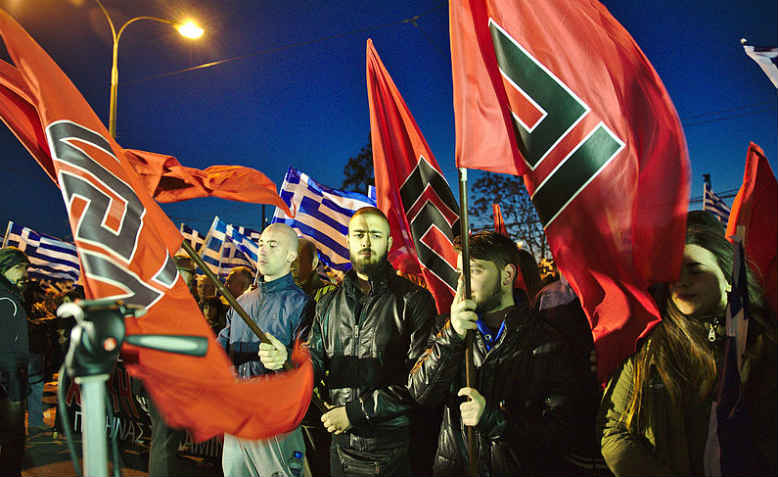 Golden Dawn rally, Athens, 2015. Photo: wikimedia commons
Golden Dawn rally, Athens, 2015. Photo: wikimedia commons
The trial of Golden Dawn has the potential to send a strong message to the far right world wide, argues Eleftheria Kousta
The year of 2017 oversaw a resurgence of far right populism with parties like AfD in Germany and FN in France making significant gains that allowed them to participate in the mainstream political arena.
What stands out as the most violent and extremist right wing party nowadays is Golden Dawn (GD) in Greece. Golden Dawn achieved a breakthrough in terms of parliamentary representation in 2015, when they managed to be the third most powerful party in Greece. It is infamous for its hierarchical organisation and its storm-trooper-like violent activism, concentrated mainly in working-class and migrant areas.
However, there has been a significant pushback as some of its senior members have been prosecuted for violent crimes, including murder and after mobilisation of anti-fascist and socialist grass roots movements many of its local offices have been shut down. Nevertheless, Golden Dawn remains the third most significant party in the parliament (although numbers fluctuate) and their PR team has managed to brand the trials as an attack on the ideas they hold, rather than the actual crimes they have committed.
As of 2018, the murderer of Pavlos Fyssas, named Giorgos Roupakias, has not been convicted and remains under house arrest. Moreover, Golden Dawn affiliates and sympathizers have been found within all branches of the political scene, police, military and civil service, thus making Golden Dawn very entangled within the deep-state and an important back-stage-player.
Golden Dawn has pending trials on three major cases: The brutal murder of Pavlos Fyssas in 2013, the attempted murder in a frenzied attack by Golden Dawn on Abuzeid Embarak and a group of Egyptian fishermen in their home in June 2012 and the murderous attack on Sotiris Poulikogiannis and a group of Communist trade unionists in September 2013.
All attacks have a uniformity that upon investigation reveal a lot about the line of action of GD. Attempted attacks not only have been designed to terrorize the communities of those perceived as ‘enemies’, but are also murderous. In many cases the victims have been hospitalized with serious injuries and in instances such as those of Pavlos Fyssas and Sahzad Luqman, murder was a well-calculated action and not a mere outcome of their initial operation.
Also the way they operate, through a very hierarchical order with a party apparatus, strong leadership, with storm-trooper-like raids, specific uniforms, salutations and localised action, reveal a group with a well-defined ideology and a manner of action that reminds the early organisational structure and activities of NSDAP and the Hitlerite ideological faction. As the report below mentions ‘Nothing in Golden Dawn is done accidentally’.
Since the economic collapse in 2008 the rise of populism has been mainly blamed to the current economic landscape, which albeit true, it is an argument used in order to evade political responsibility and cultural aspects that are deeply embedded within European communities. Parallels with the inter-war period are drawn to contemporary times since political violence has become even more present as the murders of Clement Meric, Jo Cox, Joomas Karrttunen, Heather Hayer and Pavlos Fyssas demonstrated.
But the outbreaks of violence then and now have to be put within context. Contemporary reasons for far-right, political violence are different today from those which were relevant in the inter-war years and far-right parties are split within different categories and are tailored to operate within a national context. Yet, albeit distinctions are important for tactical reasons, they are not absolute as all far-right parties share common elements such as racism, anti-Muslim bigotry and xenophobia mixed with anti-immigration sentiments.
The case of Golden Dawn is unique as it is a movement which explicitly belongs to the openly neo-Nazi wing of the far-right spectrum. Their current shortcomings with the law have made this model unattractive to far-right parties that want to become part of the political mainstream, but only to a certain extend. Neo-fascists manage to keep links on an international level online and in real life, as there is evidence that Golden Dawn representatives travelled to Charlottesville to participate in white-supremacist mobilisation during the times of Heather Haye’s murder.
Also due to ‘institutionalisation’ of far-right parties, such as FN in France, disenchanted and radical members might find a new home under more militant and violent organisations such as Golden Dawn which is seen as ‘credible’ and ‘genuine’. The destruction of any credibility for that alternative, therefore, has reverberations beyond Greece. There has been success already. But a huge amount depends upon the outcome of the trial.
If Golden Dawn is convicted on all counts, then the message will go out that this is a “model” of far right politics that will not bring you laurels – but a long time in prison. This is the importance of the decision the Greek judiciary must make. And it is for that reason that we alert European opinion to what is to be decided, and to their role also in ensuring that comparisons with the darkest chapter of Europe’s past do not become a self-fulfilling prophesy.
[pdf-viewer src=”https://counterfire.out.re/app/uploads/2018/09/kevin-ovenden-report-lg-pdf-683×1024.jpg” width=”1600″ height=”2000″]

